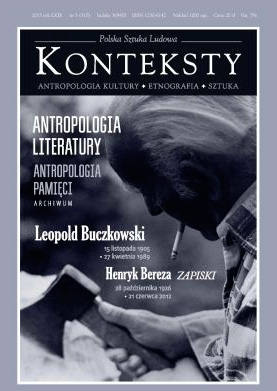„Szczęśliwe połączenie śmieci i cmentarzy”. Powieść, archiwum i miejsce pamięci w Bełżcu
“A Fortuitous Combination of Death and Cemeteries”. The Novel, the Archive, and the National Memory Site in Bełżec
Author(s): Jerzy FranczakSubject(s): Language and Literature Studies
Published by: Instytut Sztuki Polskiej Akademii Nauk
Keywords: Leopold Buczkowski;literature;anthropology;Holocaust;
Summary/Abstract: The enigmatic title of this text was borrowed from Pierwsza świetność, a novel by Leopold Buczkowski (1966), who approached the theme of the Holocaust on his own terms and did not succumb to moral blackmail offering the aesthetics of concentration camp literature, according to which obligation towards the dead is translated into spare realism and linguistic simplicity. Instead of writing novels he decided to procure ”documents” and to compile literary “archives”. In doing so, Buczkowski understood that the category of “testimony” proves to be inadequate in reference to such places as the death camp in Bełżec. Apart from several statements we do not have at our disposal numerous accounts regarding the camp. Owing to the specificity of rapid extermination it is simply impossible to seek support in the figure of the “Muselmann” [an inmate suffering from starvation and dire exhaustion], crucial for reflections about Shoah. For almost 500 000 Jews Bełżec was not a “place” but a final stage of their last journey. The challenge tackled by Buczkowski, completely alone in his work, was undertaken by Andrzej Sołyga, Marcin Roszczyk, and Zdzisław Pidek, who designed a National Memory Site in the camp. Does anything link those artistic practices attempting to define anew the relation between the landscape, memory, and representation?
Journal: Konteksty
- Issue Year: 310/2015
- Issue No: 3
- Page Range: 98-110
- Page Count: 13
- Language: Polish
- Content File-PDF

